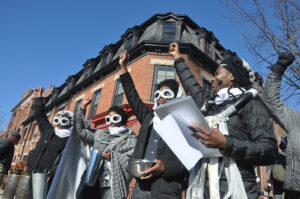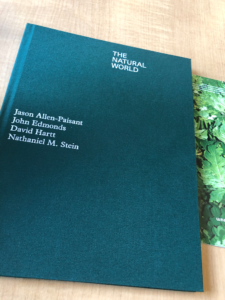Across the three days of the conference it has seemed to me that there has been a common thread that has run throughout – the necessity of performance engaging with both critique and creativity.
This is my observation and is far from exhaustive of the multiple insights of the conference. This combination of critique and creativity, however, seems essential to the ethos of the conference. It was an idea central to Adam Sitze’s Saturday evening keynote. Analysing the writings of Derrick Bell, Sitze brought together law, theology and literature to posit the possibilities that arise out of the sombre acknowledgement that a post-racist United States is an empirical impossibility. Bell, Sitze argued, criticised the majoritarian structure of the law and communicated a radical pessimism which seemingly paradoxically awakens the mind to a creative and affirmative search for alternatives.
Embedded within this ongoing paradigm of critique and creativity was the fundamental question of the conference – reiterated by the convener Jason Allen-Paisant at the end of Sitze’s paper – What can performance do and what can it not do? It was a question that was engaged with succinctly by a panel on Sunday morning which consisted of papers by Honor Ford-Smith and Vanessa-Eileen Thompson. Thompson’s paper developed a Fanonian critique of the politics of recognition in France. Through ethnographic fieldwork with the the Brigade Anti-Négrophobie, Thompson stressed a powerful critique of how memorial politics of recognition in France obscures ongoing postcolonial violence and power imbalances in the nation. Ford-Smith’s paper concerned the ‘Letter from the Dead’ performances in Canada and Jamaica which she part curated. These public acts demanded recognition separate from state sanctioned memorials – that is, outside of the politics of recognition which Thompson highlighted as obfuscating in France. In the Kingston performance, local women marched on government buildings to highlight the silence from the Jamaican government over local violence, as well as to counter a narrative around the globe that reported the violence whilst ignoring the complicity of neocolonial practices. Ford-Smith argued that through performance, ‘Letters from the Dead’ created a space for social remembrance building connections between those who had lost people to violence. In these two papers, then, we were presented with both the critique and creativity made possible by performance engaged with memory.
These papers did not suggest that performance alone is sufficient. Performance and performance-as-activism are undoubtedly only one part of a complex response necessary to multi-faceted neocolonial practices that are also differentially felt in different locations. What I shall take home from the conference, however, is the possibility of performance to open up creative spaces that refuse monolithic strategies of resistance and instead create the space for re-examining the past, invigorating the present and transforming the future.
Video: From “Song for the Beloved”, an interactive performance that re-members Blacks killed as a result of state violence across the world. More here: http://www.yorku.ca/hoperoad/projects/song.php




